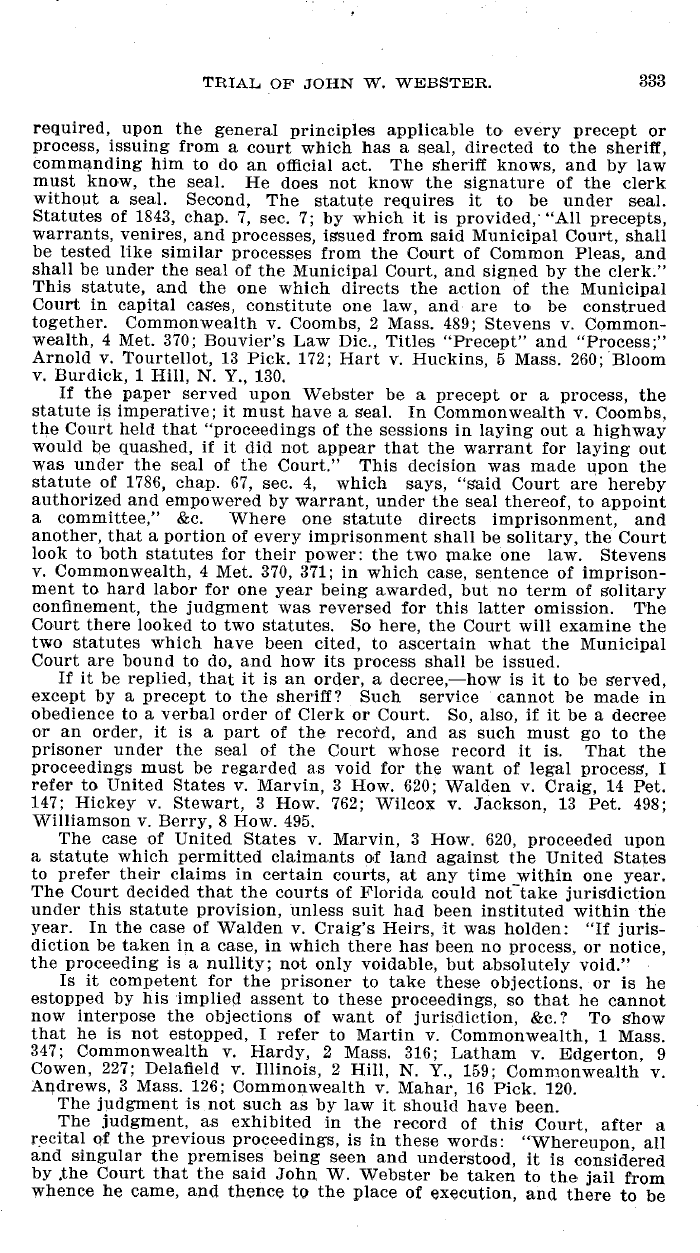|
TRIAL OF JOHN W. WEBSTER. 333
required, upon the general principles applicable to every precept or
process, issuing from a court which has a seal, directed to the sheriff,
commanding him to do an official act. The sheriff knows, and by law
must know, the seal. He does not know the signature of the clerk.
without a seal. Second, The statute requires it to be under seal.
Statutes of 1843, chap. 7, sec. 7; by which it is provided, "All precepts,
warrants, venires, and processes, issued from said Municipal Court, shall
be tested like similar processes from the Court of Common Pleas, and
shall be under the seal of the Municipal Court, and signed by the clerk."
This statute, and the one which directs the action of the Municipal
Court in capital cases, constitute one law, and are to be construed
together. Commonwealth v. Coombs, 2 Mass. 489; Stevens v. Common-
wealth, 4 Met. 370; Bouvier's Law Die., Titles "Precept" and "Process;"
Arnold v. Tourtellot, 13 Pick. 172; Hart v. Huckins, 5 Mass. 260; Bloom
v. Burdick, 1 Hill, N. Y., 130.
If the paper served upon Webster be a precept or a process, the
statute is imperative; it must have a seal. In Commonwealth v. Coombs,
the Court held that "proceedings of the sessions in laying out a highway
would be quashed, if it did not appear that the warrant for laying out
was under the seal of the Court." This decision was made upon the
statute of 1786, chap. 67, sec. 4, which says, "said Court are hereby
authorized and empowered by warrant, under the seal thereof, to appoint
a committee," &c. Where one statute directs imprisonment, and
another, that a portion of every imprisonment shall be solitary, the Court
look to both statutes for their power: the two Inake one law. Stevens
v. Commonwealth, 4 Met. 370, 371; in which case, sentence of imprison-
ment to hard labor for one year being awarded, but no term of solitary
confinement, the judgment was reversed for this latter omission. The
Court there looked to two statutes. So here, the Court will examine the
two statutes which have been cited, to ascertain what the Municipal
Court are bound to do, and how its process shall be issued.
If it be replied, that it is an order, a decree,-how is it to be served,
except by a precept to the sheriff? Such service cannot be made in
obedience to a verbal order of Clerk or Court. So, also, if it be a decree
or an order, it is a part of the record, and as such must go to the
prisoner under the seal of the Court whose record it is. That the
proceedings must be regarded as void for the want of legal process, I
refer to United States v. Marvin, 3 How. 620; Walden v. Craig, 14 Pet.
147; Hickey v. Stewart, 3 How. 762; Wilcox v. Jackson, 13 Pet. 498;
Williamson v. Berry, 8 How. 495.
The case of United States v. Marvin, 3 How. 620, proceeded upon
a statute which permitted claimants of land against the United States
to prefer their claims in certain courts, at any time within one year.
The Court decided that the courts of Florida could not take jurisdiction
under this statute provision, unless suit had been instituted within the
year. In the case of Walden v. Craig's Heirs, it was holden: "If juris-
diction be taken in a case, in which there has been no process, or notice,
the proceeding is a nullity; not only voidable, but absolutely void."
Is it competent for the prisoner to take these objections, or is he
estopped by his implied assent to these proceedings, so that he cannot
now interpose the objections of want of jurisdiction, &c.? To show
that he is not estopped, I refer to Martin v. Commonwealth, 1 Mass.
347; Commonwealth v. Hardy, 2 Mass. 316; Latham v. Edgerton, 9
Cowen, 227; Delafield v. Illinois, 2 Hill, N. Y., 159; Commonwealth v.
Andrews, 3 Mass. 126; Commonwealth v. Mahar, 16 Pick. 120.
The judgment is not such as by law it should have been.
The judgment, as exhibited in the record of this Court, after a
recital of the previous proceedings, is in these words: "Whereupon, all
and singular the premises being seen and understood, it is considered
by ,the Court that the said John W. Webster be taken to the jail from
whence he came, and thence to the place of execution, and there to be
|

